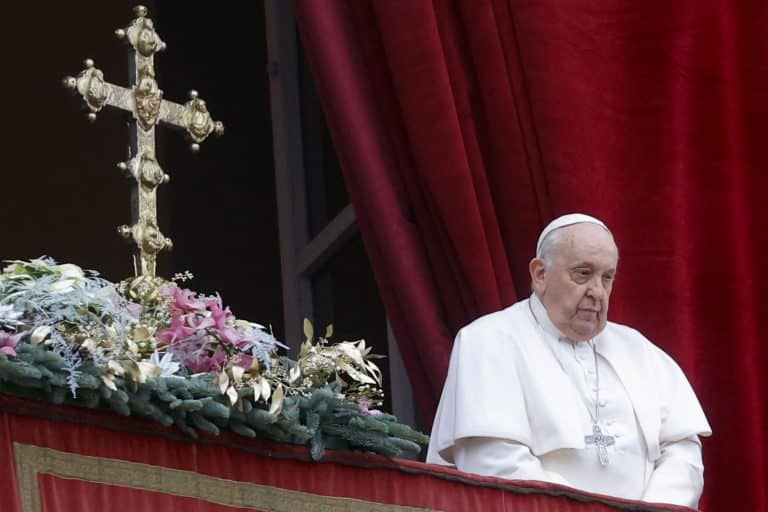9 de enero 2024

“NicaraguAmor” Cultural Caravan for Nicaraguans in the USA

PUBLICIDAD 1M
PUBLICIDAD 4D
PUBLICIDAD 5D
The pontiff insists on “respectful diplomatic dialogue” with the Ortega-Murillo dictatorship.

Pope Francis from the window of the Apostolic Palace after praying the first Angelus of the year 2024. Photo: EFE/Claudio Peri
Pope Francis once again expressed deep concern about the prolonged socio-political crisis in Nicaragua and the painful consequences it has left on society, particularly on the Catholic Church, which, as of January, has accumulated 203 persecuted, exiled, or imprisoned clergy and other religious people by the dictatorship.
“The situation in Nicaragua continues to be worrisome; it is a crisis that has been going on for a long time with painful consequences for the entire Nicaraguan society, particularly for the Catholic Church,” said the pontiff on Monday January 8, in his speech to the diplomatic corps accredited to the Holy See.
He also reiterated his invitation to the dictatorship of Daniel Ortega and Rosario Murillo for a “respectful diplomatic dialogue,” as he has been doing since early 2023.
“The Holy See continues to invite for a diplomatic dialogue respectful of the well-being of Catholics and the entire population,” he emphasized.
This is the second time in 2024 that Pope Francis has commented on the situation in Nicaragua. On New Years day, he expressed “concern” about the detention of Catholic priests in Nicaragua and urged that “the path of dialogue always be sought” to overcome problems.
The pontiff also called today for “greater commitment from the international community” to humanitarian rights at a time when there is “no distinction between military and civilian targets,” and noting how conflicts “indiscriminately impact the civilian population.”
“Ukraine and Gaza are clear evidence of this. We must not forget that serious violations of international humanitarian law are war crimes, and it is not enough to highlight them; it is necessary to prevent them,” he said.
In his extensive intervention, the pontiff, who once again called for a “worldwide disarmament policy” and dialogue as the “soul of the international community,” in addition to avoiding “colonizations” and “ideological polarizations.” In reviewing the international situation, particularly the wars in Gaza and Ukraine, he called for a ceasefire and the start of negotiations.
“I reiterate my appeal to all parties involved to agree to a ceasefire on all fronts, including in Lebanon, and for the immediate release of all hostages in Gaza. I ask that the Palestinian population receive humanitarian aid, and that hospitals, schools, and places of worship have all the necessary protection.”
Francis recalled that “we were all shocked by the terrorist attack on the population of Israel on October 7th” and that it caused “a very serious humanitarian situation with unimaginable suffering.”
“I trust that the international community will promote with determination the solution of two states, one Israeli and one Palestinian, as well as an internationally guaranteed special status for the City of Jerusalem so that Israelis and Palestinians can finally live in peace and security.”
In addition, the war in Gaza “which further destabilizes a fragile and tense region,” he said, not forgetting the Syrian people, who “live in economic and political instability,” like the Lebanese, to whom he directed “a particular thought” with the hope that they will soon have a president.
Francis also referred to “the large-scale war of the Russian Federation against Ukraine,” highlighting that after almost two years, “the desired peace has not yet been achieved,” despite “the numerous victims and enormous destruction” and asserted: “It is necessary to end the ongoing tragedy through negotiations, respecting international law.”
He further mentioned, “the tense situation in the southern Caucasus between Armenia and Azerbaijan,” and urged “the parties to reach the signing of a peace treaty” because “it is urgent to find a solution to the dramatic humanitarian situation of its inhabitants” and “facilitate the return of displaced persons to their homes legally and safely.”
In Africa, he highlighted “the suffering of millions of people due to multiple humanitarian crises (…) due to international terrorism, complex socio-political problems, and the devastating effects of climate change.” He further recalled “the dramatic events in Sudan,” “as well as the situations of displaced persons in Cameroon, Mozambique, the Democratic Republic of the Congo, and South Sudan.”
Regarding the American continent, the pontiff said that “while there are no open wars,” “strong tensions exist between some countries, for example, between Venezuela and Guyana, while in others, like Peru, we observe a phenomenon of polarization that undermines social harmony and weakens democratic institutions.”
This article was published in Spanish in Confidencial and translated by Havana Times. To get the most relevant news from our English coverage delivered straight to your inbox, subscribe to The Dispatch.
PUBLICIDAD 3M
Confidencial es un diario digital nicaragüense, de formato multimedia, fundado por Carlos F. Chamorro en junio de 1996. Inició como un semanario impreso y hoy es un medio de referencia regional con información, análisis, entrevistas, perfiles, reportajes e investigaciones sobre Nicaragua, informando desde el exilio por la persecución política de la dictadura de Daniel Ortega y Rosario Murillo.
PUBLICIDAD 3D